Challenge Yourself, Change the World: #WeDoHardStuff Pays It Forward
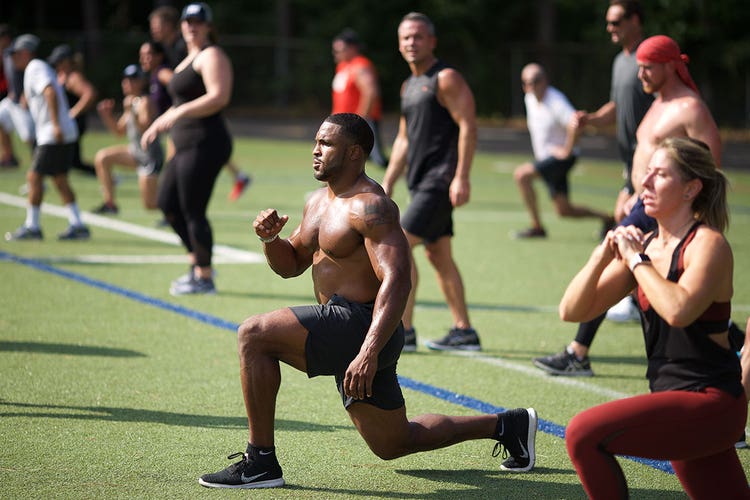
Endurance athlete Jesse Itzler knew the payoffs of a grueling physical challenge. He had scaled the vertical equivalent of Mount Everest in a weekend, run 100 miles in 24 hours and trained with a former Navy SEAL under his roof for 30 days. But how, he thought, could he make these fitness challenges really benefit the world at large?
The answer came in January 2016 when he made his New Year’s resolution, vowing to do 2,016 of each of the five exercises he hated the most that month — burpees, push-ups and crunches — for a good cause. He challenged friends on social media to join him, offering a $100 donation for each that completed the challenge. The response was larger than he expected.
So big in fact, that he kicked off 2017 with a website and a dedicated Facebook group now called #WeDoHardStuff, which boasts almost 11,000 members around the globe. Since its inception, the group has raised more than half a million dollars for charities such as the Special Operations Warrior Foundation, the Triple Negative Breast Cancer Foundation and the Autism Hope Alliance. It also has helped build a school with Pencils of Promise.
The exercise, Itzler says, was the selling point. “I’ve never heard anyone say, ‘I want to be less fit.’” Group accountability and the idea that you’re helping a child in need or funding important research also kept people in the challenge when they didn’t feel up to it.
How does #fitlanthropy work?
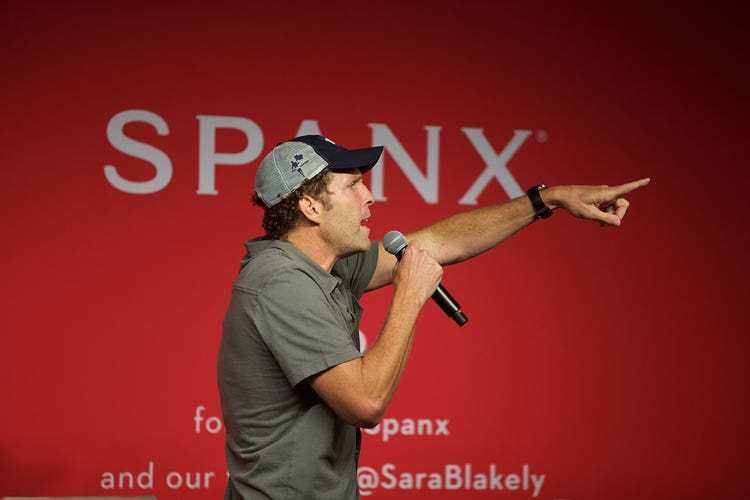
Each month, Itzler sets a new challenge and a new charity. Most are physical, such as January’s challenge that asked participants to complete as many as 45 hashtag workouts with each letter of the hashtag—such as #NewYearNewMe and #ThisOneIsReallyHard—correlating to a challenging exercise. The workouts ranged from planks to lunges to squat jumping jacks to chair dips.
But there are also wellness and mental health challenges such as writing someone a thank-you or an apology letter, taking a cold shower or performing an act of community service.
“I wanted to make it really participatory. I didn’t want to limit it to people with access to gym equipment or treadmills,” Itzler explains. “Anyone can do it. We just give them something to follow.”
Group members post their progress on Facebook to get praise and encouragement from the group, or they just use it to seek support and share weaknesses when they’re having a hard time staying on track. Furthermore, Itzler says, sweaty selfies provide visual proof to those struggling to commit that even the busiest among us find ways to squeeze in exercise.
Pushing limits
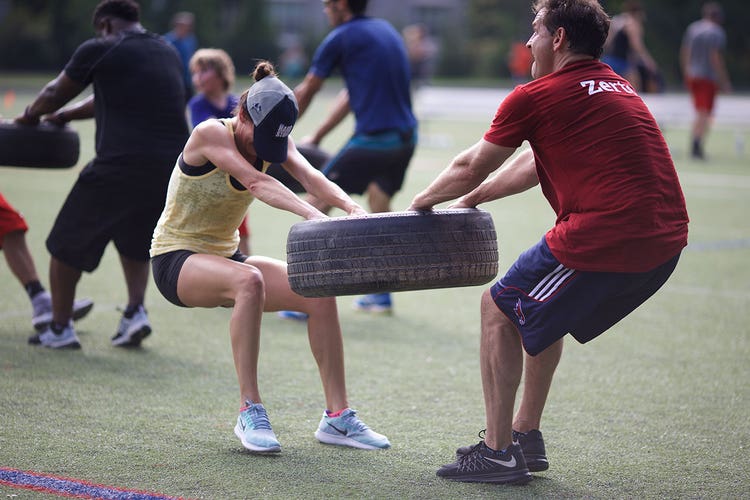
For some newbies to the group, the challenge may be the first time they’ve pushed themselves as hard in exercise, he says, and many fear the discomfort and embarrassment that comes along with being pushed out of their comfort zone. But it’s also where they’re more likely to see results, both on and off the scale.
“Once you start something and start seeing results and feeling good about the effort, that’s when the magic happens,” Itzler says.
He says he has seen tremendous personal transformations in the group as participants get active, shed excess weight and acquire a new confidence.
But aside from the scale, Itzler says, he also has seen many participants become more goal oriented, challenging themselves to take on more difficult challenges, both in fitness and at work.
“I think it’s the same courage and same discipline to get involved in a program that it takes to leave a job you’re unhappy with or start a new business or set other goals,” he says.
Building a life resume
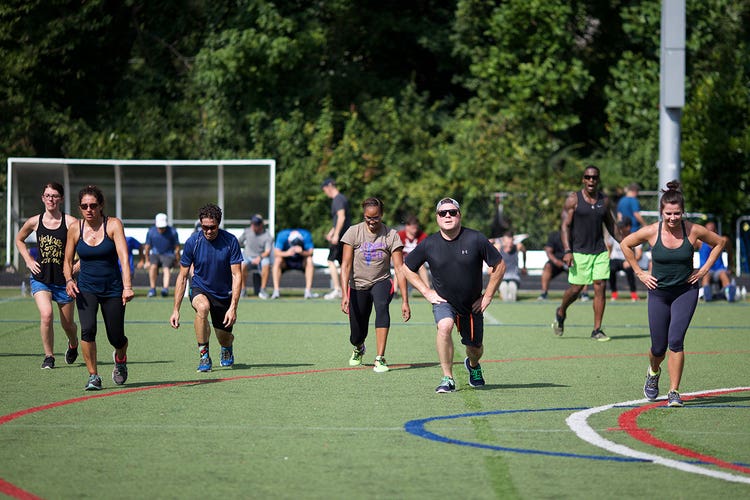
Indeed, Itzler credits difficult physical challenges with changing his mindset and helping him adapt and react with more patience to roadblocks and frustrations in daily life.
Taking risks and working on his courage and commitment have allowed Itzler to chase all sorts of dreams—from cofounding Marquis Jet to launching the coconut water trend with a partner in Zico to buying the NBA Atlanta Hawks, all while squeezing in family time with his four kids and wife Sara Blakely, owner of shapewear company Spanx.
“Through doing things that were really hard consistently, every day pushing myself, changed my mind,” Itzler says on a promotion for the challenge. “Not just physically but even in life when hard obstacles come at me, I deal with them completely differently.”
And to those who think they’re not fit enough, he stresses that he, too, started at a very different place decades ago. His first personal challenge in his 20s was running 2 miles a day without stopping. It took him two weeks to accomplish his goal in 18 minutes, he recalls. And afterward, he realized that it wasn’t really his body that had changed in those weeks, just his perception of his limitations. So he kept on going, running 40 minutes, then an hour, then a marathon.
Since that time, he has run 100 miles in 24 hours and developed the 29029 challenge, during which athletes summit Stratton Mountain in Vermont 17 times in one weekend, the equivalent of scaling Mount Everest.
Itzler has written two books on his exploits. “Living With a SEAL” chronicles his month with extreme in-home SEAL team training, and the forthcoming “Living With the Monks” is about his time with the New Skete monks, learning to slow down and engage in more self-reflection.
#Groupgoals
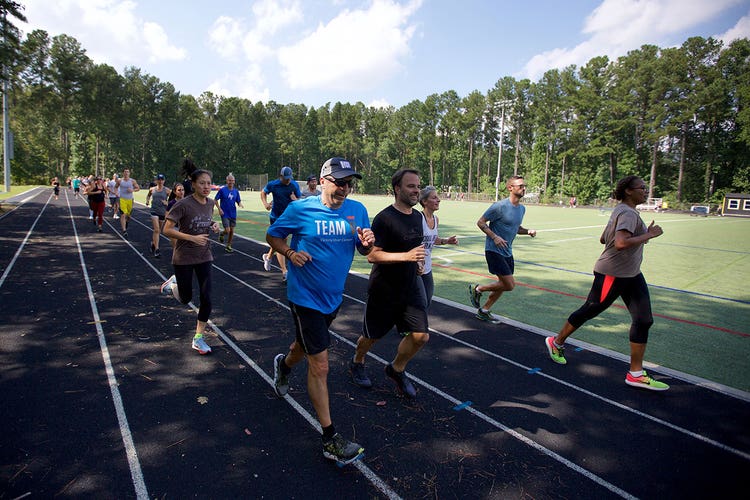
The #WeDoHardStuff Facebook group, Itzler says, is something he’s become really proud of because it has successfully taken two of the things he is most passionate about—fitness and philanthropy—and encouraged them in other people.
“When I started, I thought two or three friends would join me in this,” Itzler says. “But it has become a real community. I am thrilled that people are so supportive.”
The group had its first live event in Atlanta last fall, where attendees worked out together and sat in on inspiring speakers discussing health, longevity and goal setting. Itzler hopes to bring more inspiring speakers and content online, helping group members to crush their goals and become “fitlanthropists.”
And while Itzler was the one making all the charitable donations at first, the focus at #WeDoHardStuff has now shifted to Itzler encouraging, but not requiring, others to donate $5 or $10 for each monthly challenge they complete to groups such as January’s recipient, The Felix Organization. The group provides opportunities and experiences for kids in foster care. Itzler now makes a flat donation separately.
“Anytime you tie in philanthropy and you are doing something for a greater cause, it becomes more meaningful, impactful and special,” Itzler says. “That [for many people] has been a big motivator.”
Photo credit: Courtesy Jesse Itzler